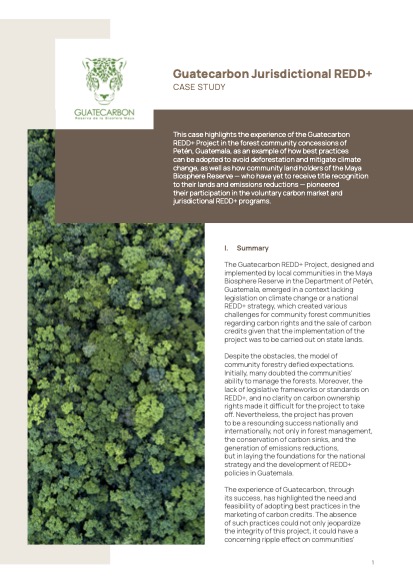Benefit sharing is a critical component of REDD+ forest carbon projects, particularly where Indigenous peoples and local communities are central to forest stewardship. As REDD+ evolves into market-based mechanisms, with carbon credits generating revenue in international carbon markets, ensuring that benefits are distributed fairly is essential for the long term success of the initiative. However, achieving equitable benefit sharing remains a major challenge. Complex land tenure, power imbalances among stakeholders, and the lack of clear legislative frameworks can put local communities rights at risk in securing just compensation for their efforts.
This case study explores the Guatecarbon REDD+ Project, a community-led initiative in the Maya Biosphere Reserve, Petén, Guatemala, which engaged a transparent, inclusive process to secure an equitable negotiation of benefits for community forest concession holders. Launched before Guatemala had national climate legislation or a REDD+ strategy, the project immediately faced legal hurdles, especially around carbon rights and the sale of carbon credits on state-owned land. At the time, the legal framework only recognized carbon rights for private owners, legal land holders, or the government, thereby excluding traditional forest communities.
Although the project succeeded in reducing emissions and protecting the forest, it took nearly two decades of advocacy before forest communities were legally allowed to receive direct payments for their conservation work. A key turning point came with Decree 20-2020, which introduced the concept of “implementers” as eligible actors under Guatemala’s Jurisdictional Emissions Reductions Program (PRE). This recognition acknowledged the fundamental work of forest communities in achieving emissions reductions, regardless of their link to land ownership. This legal shift made it possible for the members of the Asociación de Comunidades Forestales de Petén (ACOFOP), a community forestry association in the region, to successfully secure eligibility for community landholders.
The case underscores both the proven success of community forest management and the prolonged fight for legal recognition in accessing carbon finance on public lands.
Click here to read the case study in Spanish.
Click here to read the case study in Portuguese.
Collaboratively authored by the Asociación de Comunidades Forestales de Petén (ACOFOP) and Rainforest Foundation US (RFUS).




